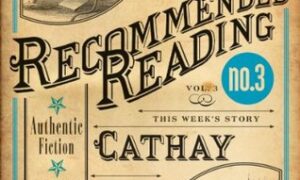 Tales of The Bastard Drunk by D.M. Woon
Tales of The Bastard Drunk by D.M. Woon
My rating: 3/5 cats



this is good, solid, splattery horror that also playfully takes a meta-step back from itself to poke fun at the conventions of the horror genre and at its own content. it’s a collection of linked stories, but there’s an overarching narrative holding them together, so they aren’t really standalones.
it takes place in the british town of kramusville, on a—yes—on a dark and stormy night. fitz and paul are on their way to an important conference when their car breaks down. they cross a spooky and decrepit old bridge complete with unsettling noises and possible apparitions (doing the classic, “was that? nahh, couldn’t be” brush-off that is required of all participants in horror stories) and find themselves in a ghost town that nonetheless is where they are meant to catch their train. cellphone reception being spotty and no train available until morning, they are forced to wait out the storm and pass the time at the finger inn, where they can drink some beers and relax.
but there will be no rest in kramusville, only unspeakable horror and unease. muahahahaaaaaaaaa
at least there’s beer.
the pub is deserted except for the creepiest bartender ever, and a man sitting in the shadows known as “the bastard drunk.” and for the price of a drink, the bastard drunk will share the stories of kramusville; all the urban legends and haunting deaths that have plagued the town for years.
which deal our two friends accept gladly, as waiting-room entertainment.
and the stories roll offa the bastard drunk, each more horrific than the last. but fitz and paul are a tough crowd, and fitz isn’t buying what the bastard’s selling:
Fitz took a sip of his drink, held it in his mouth for a moment, then swallowed with a frown. “Are the lights going to fail in every tale you tell us?” The Bastard eyed him curiously. “The fuck is that supposed to mean?” “The lights on the train flickered, the lights in the corridor flickered; we’re not stupid, Bastard. We’re very aware of the suspense you’re trying to create, but there must be a different cliché device up your sleeve.”
which is a nice little giggle. fitz continues to challenge the bastard’s storytelling abilities:
“Are you callin’ me a liar?”
“I’m just questioning your abilities as a storyteller, that’s all. You’re trying to sell us these tales as fact, and yet you’re expecting us to believe the impossible. Now, I’m willing to suspend disbelief when it comes to dialogue; there’s no way of you knowing what conversations took place behind closed doors. I’m even ready to accept character backstories; maybe you know for sure about Polly’s childhood trauma, maybe you don’t, but adding depth to your protagonist is never a bad thing…But you’re too explicit, too definite…the not knowing for sure, the supernatural becoming an almost rational explanation for the unknown; that’s where the fear lies, Bastard.”
i appreciate this device, the taking the reader out of the story to address the very nature of storytelling and asking the kinds of questions a rational person asks when confronted with horror stories. because for the most part, the bastard’s tales are very traditional slumber party stories: the woman traveling alone late at night, the revenge from beyond the grave, the brainwashed children—it’s all very conventional. and fitz continues to shoot them down and voice his disbelief and point to the weaknesses in the bastard’s storytelling abilities, who in turn continues to defend them and it becomes an almost lighthearted respite alternating with all the gore.
but it’s not lighthearted for long. as the stories and the arguments continue, the two worlds collide and the horror elements bleed into the the finger inn narrative as the bastard drunk reveals that he knows o so many details of fitz and paul’s lives and that their story will one day be just like any other in his mind; a chilling tale used to terrify and delight some other hapless visitor to kramusville.
it’s a fun experiment in horror writing. i enjoyed the referential winks and the overall structure—nothing beats the story-within-a-story setup in my opinion. the individual stories are also good, although as fitz points out, there are a lot of clichés in them. what he can’t point out is that the “travelers who meet a spooky character on a spooky night and find themselves imperiled” is itself a cliché, but the reader doesn’t need that spelled out for them.
do not mess with the bastard drunk, is my advice.
read my book reviews on goodreads







